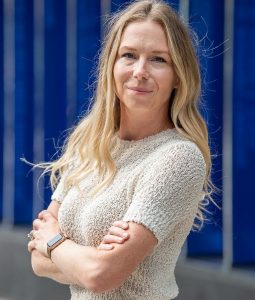Lindsay Jibb, a leading researcher and pediatric oncology nurse, has received a substantial grant from the Canadian Institutes of Health Research (CIHR) to conduct a pan-Canadian study on the psychosocial impacts of COVID-19 on children with cancer as well as their families and caregivers.
The funding opportunity will support Jibb who is also an assistant professor at the Lawrence Bloomberg Faculty of Nursing and her co-principal applicant Dr. Nicole Albert at Concordia University, in leading a multidisciplinary study with a group of childhood cancer survivors. The study will also include perspectives from nurses, physicians, PhD students, and psycho-social health experts who will help to determine how the COVID-19 pandemic has altered services normally provided to children with cancer.
“We know that kids have been hit hard in terms of their mental health by the pandemic,” says Jibb who is also the Signy Hildur Eaton Chair in Pediatric Nursing Research at the Hospital for Sick Children. “But kids with cancer and childhood cancer survivors may be in a position that puts them at an even higher risk of negative mental health outcomes. This may be true for their families as well.”
Prior to the pandemic, some of the psychosocial supports made available to children with cancer and their families would have included playrooms in hospital, peer support nights for siblings and caregivers, and other opportunities organized by hospitals and institutions like camps for children to connect with one another. Hospital appointments could have been attended by more than one parent or support person, and external family support would have been called upon when needed. But with restrictions in place because of the pandemic, most if not all of these initiatives would have been paused.
Jibb and her team are also looking to examine the impact of additional stressors on psychosocial outcomes, including children not being able to attend school and parents and caregivers trying to work from home while caring for a child with cancer, as well as limited access to external family support.
This kind of data will provide a picture of the psychosocial health status of children with cancer, their families, and survivors, from health jurisdictions across the country, that will help determine what might be working well and where further interventions might be needed.
“We want to know from parents and children what happened to them during this unprecedented time, and we want to know what might have worked well for them, like virtual care appointments. Perhaps being in their own home environment with a sick child has been beneficial and is something that should be continued, but right now we don’t have that data and that is why this study is so important,” says Jibb.
As part of the study, health care providers across the country will be also interviewed to determine how quickly they were able to pivot any support resources online, and what resources they might need to continue offering appropriate supports moving forward.
“Our team is hoping this study will shed much-needed light on the unprecedented impact of the pandemic on children with cancer and their families and provide them with the support and resources required to improve their quality of life and care,” says Jibb.
